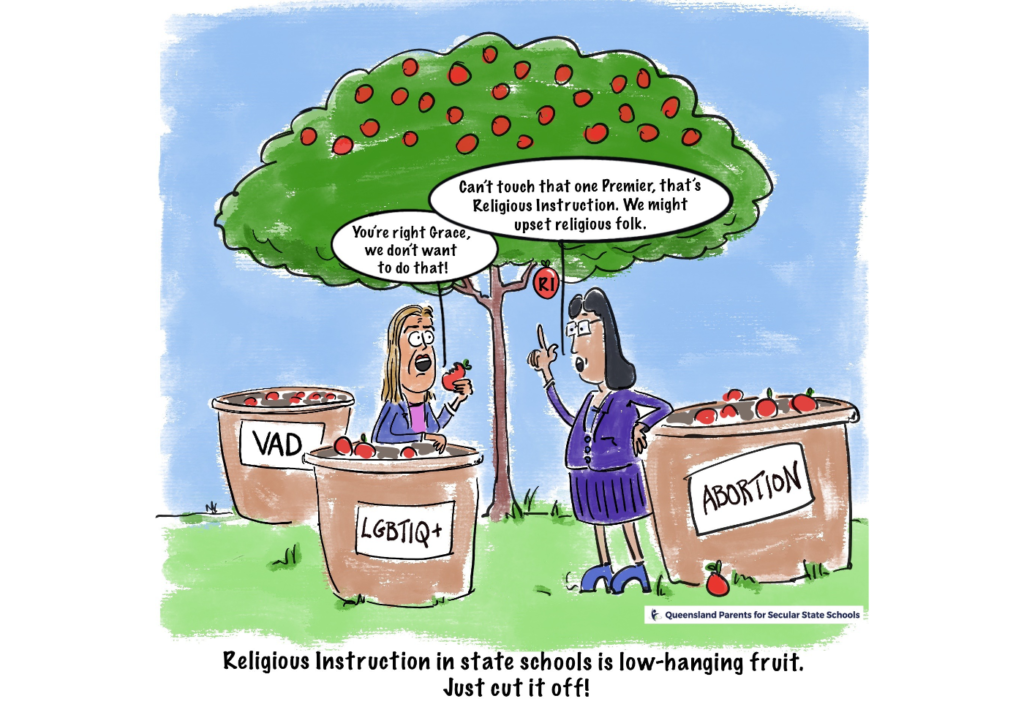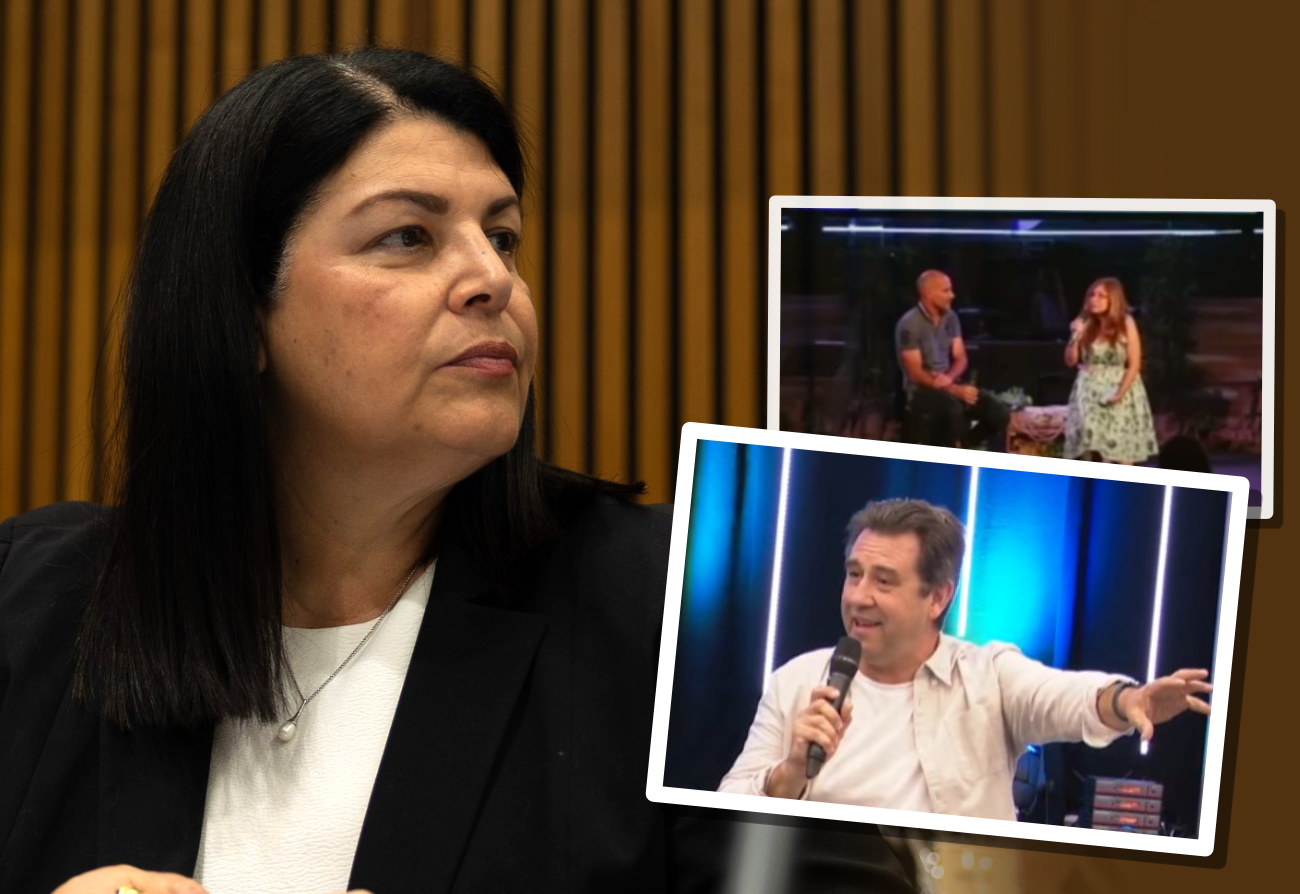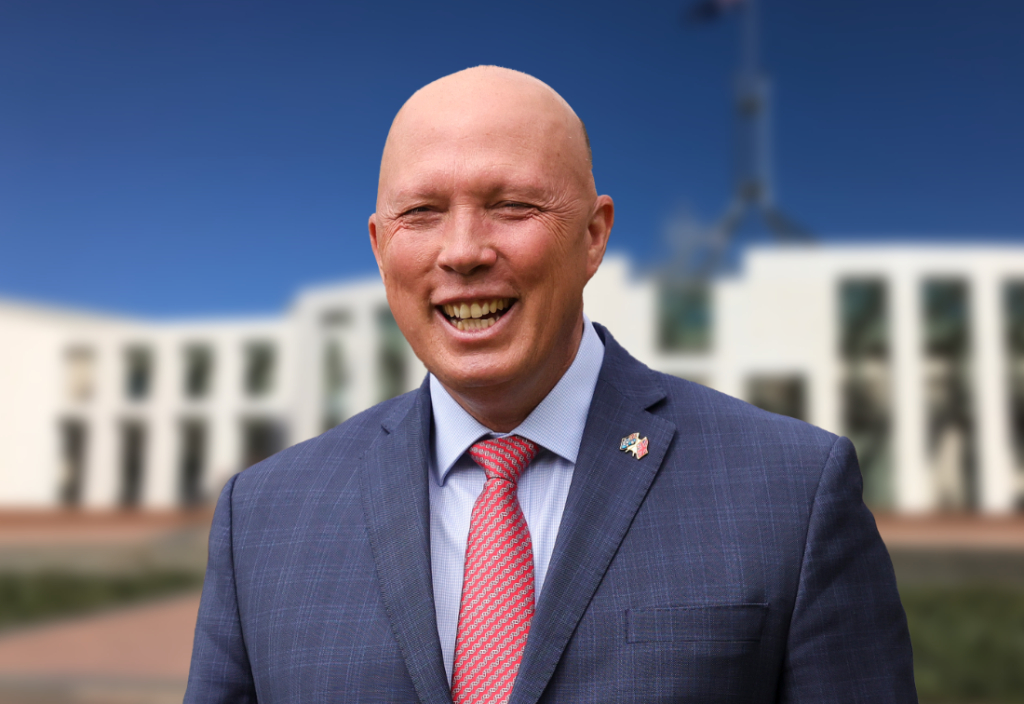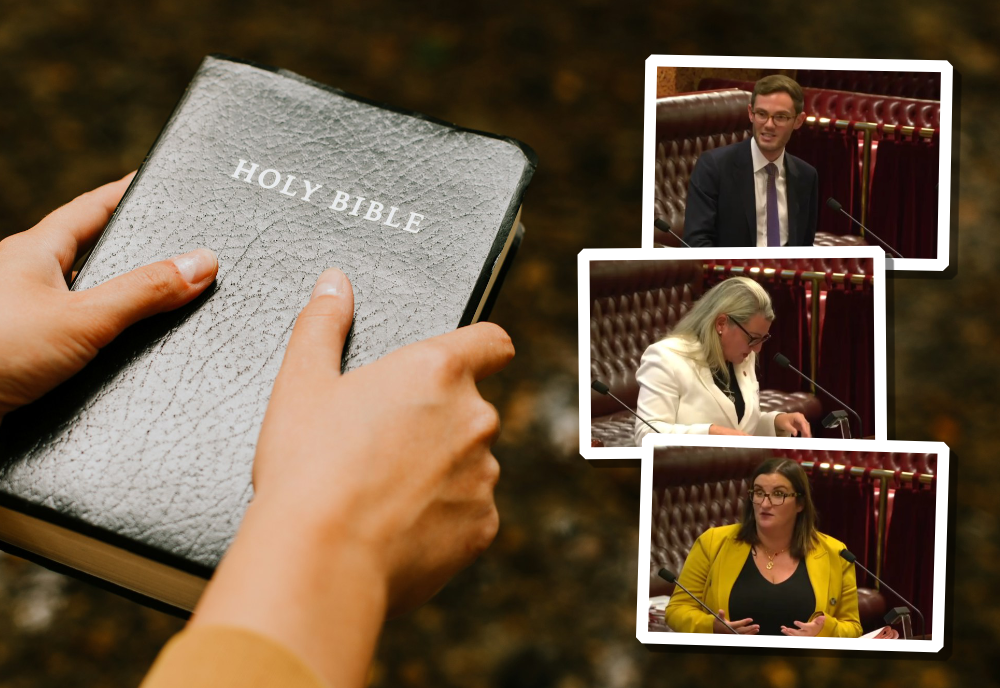Queensland’s education minister Grace Grace faces a decision of either listening to her Labor colleagues and their call to remove Religious Instruction (RI) from school hours, or “holding the line” for the Christian Right in the Liberal-National opposition.
Following the public backlash in response to media reporting on how Christian missionaries view public schools as “mission fields” and kids ripe for “harvesting”, one would think that removing the RI program from class time would be ‘low-hanging fruit’ for the Palaszczuk government.
As I have previously argued on ABC Radio, the state government has, in recent years, introduced laws to decriminalise and improve access to abortion, and make voluntary assisted dying an option for terminally ill Queenslanders.
In both instances, the Palaszczuk government comfortably handled the criticism from religious lobbyists to make those widely popular reforms. Although a number of state Labor members of parliament have now spoken out against RI – with one, Don Brown, saying “time is up” for RI in state schools – the government has given no sign that it is considering reform on RI.
It is no surprise that the voices calling for RI to stay in public schools are coming from the Christian Right within the Liberal National Party.
Earlier this month, Mark Robinson – a member of the state parliament since 2009 – used a speech to parliament to urge Minister Grace to “hold the line against the current attacks” and “keep RI”.
Dr Robinson is a director of, and an occasional preacher at, the Pentecostal church known as Favor Church in Brisbane. The church’s mission, according to the Australian Charities and Not-for-profit Commission website, is to “promote and foster the development of Christianity and the belief in our Lord Jesus Christ as Saviour”.
In 2020, he appeared as a guest speaker at the dominionist Church & State Summit – an event that brings members of the Christian Right together to discuss how to infiltrate politics and parties. Just a few days ago, he joined Australian Christian Lobby spokesperson Wendy Francis at the anti-abortion rally in Brisbane. Later this year, he is scheduled to appear as a guest speaker at the Apostolic Summit entitled ‘Roar Over Nations’.
With Dr Robinson leading the push to retain RI in public schools, it is worth taking a closer inspection of the arguments he used in his speech to parliament.
He opened by stating the importance of Easter to many Christians, adding a claim that God’s message of “love, acceptance and forgiveness” is important to everyone – a typical statement for many practising Christians.
Perhaps if he had left it there, I would have been able to suppress the urge to put figurative pen to paper in response to his speech. But he didn’t.
Dr Robinson went on to cite two articles and several well-worn talking points provided by a recent media statement from the Multi-faiths RI group which contain claims that cannot be left unchallenged.
The articles Dr Robinson tabled with his speech purportedly showed that the program was “helpful for school-age children to have the opportunity to be taught spirituality with a message of love and acceptance”.
Firstly, though ‘love’ and ‘acceptance’ are worthy ideals, these words do not appear in any of the three documents he cited.
Secondly, and critically, ‘spirituality’ is emphatically not synonymous with ‘religion’. This constant and disingenuous equating of the two by those who argue for religious involvement in public schools via both the RI and the school chaplaincy program is so pervasive that one may be forgiven for thinking it is a tactic that features heavily in some kind of RI apologists’ manual.
Both of the articles he tabled refer to spirituality in the form of meditation, as well as more traditional religious practices. While one article does look specifically at church attendance and prayer, as well as meditation, among children aged from 9-14 years, the other cited article is related to the benefits of considering the spiritual needs of patients in health-care settings.
The latter even supplies a definition of ‘spirituality’ that places religion firmly in the sub-category box. Notably, neither document refers to doctrinal faith lessons being provided in public schools.
Undeterred, Dr Robinson segued smoothly to the content of the Multi-faiths RI media statement. It was there that solipsism truly took centre stage.
RI gives parents a choice of faith in their child’s education, he proclaimed. This statement ignores the fact that parents can choose for their children to attend one of the countless places of worship freely available to all, not to mention the option of faith-based schooling for those who can afford it.
Right there are two options for imparting religious beliefs – both of them are heavily subsidised by the public purse – that do not impinge on the education of anyone else’s child.

The claim ignores the fact that in Queensland principals have no choice to say ‘no’ to RI interrupting the school day. Similarly, nor do teachers have the choice to say ‘no’ to handing over their classroom to missionaries.
The claim also disregards the fact that non-participating students have no choice to continue with curriculum learning while RI takes place for those whose parents have given them permission to take part.
All this casts into doubt the very rubbery numbers declared as evidence of the supposed popularity of RI – a fragile façade that would instantly crumble without the protective policy, legal layers and lack of real choices that see RI without any kind of competition.
RI providers are keenly aware of this and are fearful of a repeat of what happened in Victoria, where faith lessons were moved outside class time and where ‘choice’ truly became a thing.
Perhaps the most disingenuous aspect of the ‘choice’ argument is the implication that there is a veritable smorgasbord of faiths from which to choose, apparently catering to the rich diversity in Queensland state schools. This is pure theatre.
Christian RI dominates, representing over 95 per cent of RI classes that are available. A handful of minority faiths make up the remainder and are present in a tiny number of schools.
Extraordinarily, Dr Robinson touted RI as supporting multiculturalism in our multi-faith society and as contributing to social cohesion. This has been partially refuted with the above elucidation about the reality of RI offerings.
Even if RI were available in every religion imaginable, the question remains as to how our multicultural society is going to be enhanced by segregating young children in state schools to impart mutually exclusive religious doctrine.
Research shows worldviews education that is provided by qualified teachers engenders understanding and tolerance, and equips all students with at least some knowledge of minority faiths – communities that are all too often subjected to ignorant stereotyping.
And what of the ever-increasing number of the non-religious? Do they have no culture to speak of? Nothing to contribute to the rich fabric of our society? A whole demographic is unequivocally excluded from any consideration whatsoever.
In his speech, Dr Robinson rattled off other rhetorically appealing points of RI. He said the program supported values that were embedded in the curriculum, provided a well-rounded education and produced psychological benefits.
It seems Dr Robinson is perfectly happy for only students attending RI to have these supposed benefits. Values are modelled by qualified teachers to all students in classrooms every day. All students deserve a holistic, well-rounded education from their time in public schools, regardless of religious persuasion.
Likewise, activities with psychological benefits should be in a form accessible to all students.
The selectiveness, sense of entitlement and callous disregard for the non-religious cohort by RI proponents provide powerful reasons against continuing to privilege religious groups with access to public school classrooms – a privilege they have enjoyed in Queensland for well over a century.
The choice for Minister Grace is clear. Instead of siding with the Religious Right in the Liberal National Party, she should listen to her Labor colleagues and the Queensland public on RI. Instead of “holding the line” for Dr Robinson and the harvesters, Minister Grace should be championing inclusive education by moving RI outside school hours and giving that time back to teachers for the benefit of all students.
If you wish to republish this original article, please attribute to Rationale. Click here to find out more about republishing under Creative Commons.
Image: Grace Grace MP (Facebook); screengrabs from 7News Australia, Favor Church Brisbane.














